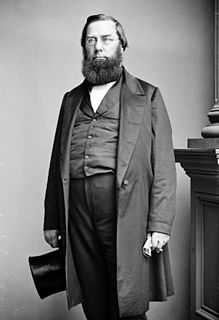A Quote by Benoit Mandelbrot
The existence of these patterns [fractals] challenges us to study forms that Euclid leaves aside as being formless, to investigate the morphology of the amorphous. Mathematicians have disdained this challenge, however, and have increasingly chosen to flee from nature by devising theories unrelated to anything we can see or feel.
Related Quotes
I claim that many patterns of Nature are so irregular and fragmented, that, compared with Euclid - a term used in this work to denote all of standard geometry - Nature exhibits not simply a higher degree but an altogether different level of complexity ... The existence of these patterns challenges us to study these forms that Euclid leaves aside as being "formless," to investigate the morphology of the "amorphous."
People look for patterns in everything. It's what keeps us sane, I suppose. I struggle to see any patterns in my life. I think I can understand depression a bit because of my sister. My own feelings of ... I'm aware that, if you feel down, it can be strangely unrelated to circumstances around you. That's just the way life is.
People look for patterns in everything. It's what keeps us sane, I suppose. I struggle to see any patterns in my life. I think I can understand depression a bit because of my sister. My own feelings of... I'm aware that, if you feel down, it can be strangely unrelated to circumstances around you. That's just the way life is.
Everyone must concede that there is in existence something wiser than himself. Now there is a challenge, there is a challenge which few even investigate. We're going to do that now. Let's see what we're talking about. All troubled people, which is all people, must if they are going to be delivered from themselves, must make the concession that there is a force, an entity, a power that is higher than their own present nature.
We see ourselves in other people’s eyes. It’s the nature of the human race; we are a species of reflection, hungry for it in every facet of our existence. Maybe that’s why vampires seem so monstrous to us—they cast no reflection. Parents, if they’re good ones, reflect the wonder of our existence and the success we can become. Friends, well chosen, show us pretty pictures of ourselves, and encourage us to grow into them. The Beast shows us the very worst in ourselves and makes us know it’s true .
Now, as Mandelbrot points out, ... Nature has played a joke on the mathematicians. The 19th-century mathematicians may not have been lacking in imagination, but Nature was not. The same pathological structures that the mathematicians invented to break loose from 19th-century naturalism turn out to be inherent in familiar objects all around us.
Challenge is the pathway to engagement and progress in our lives. But not all challenges are created equal. Some challenges make us feel alive, engaged, connected, and fulfilled. Others simply overwhelm us. Knowing the difference as you set bigger and bolder challenges for yourself is critical to your sanity, success, and satisfaction.
Since my first discussions of ecological problems with Professor John Day around 1950 and since reading Konrad Lorenz's "King Solomon's Ring," I have become increasingly interested in the study of animals for what they might teach us about man, and the study of man as an animal. I have become increasingly disenchanted with what the thinkers of the so-called Age of Enlightenment tell us about the nature of man, and with what the formal religions and doctrinaire political theorists tell us about the same subject.
Our very name for God's Creation is NATURE, for that is what Nature is. I shall define Nature for you in simple words. Nature is an electric wave thought image of God's nature, electrically projected from His formless and unconditioned ONE LIGHT into countless many forms of conditioned light which we call matter.
Regarding mutual tolerance: It is negative in one sense, but positive in another. It absolutely forbids us to be forward in pronouncing on the meaninglessness of forms of existence other than our own; and it commands us to tolerate, respect, and indulge those whom we see harmlessly interested and happy in their own ways, however unintelligible these may be to us. Hands off.





































